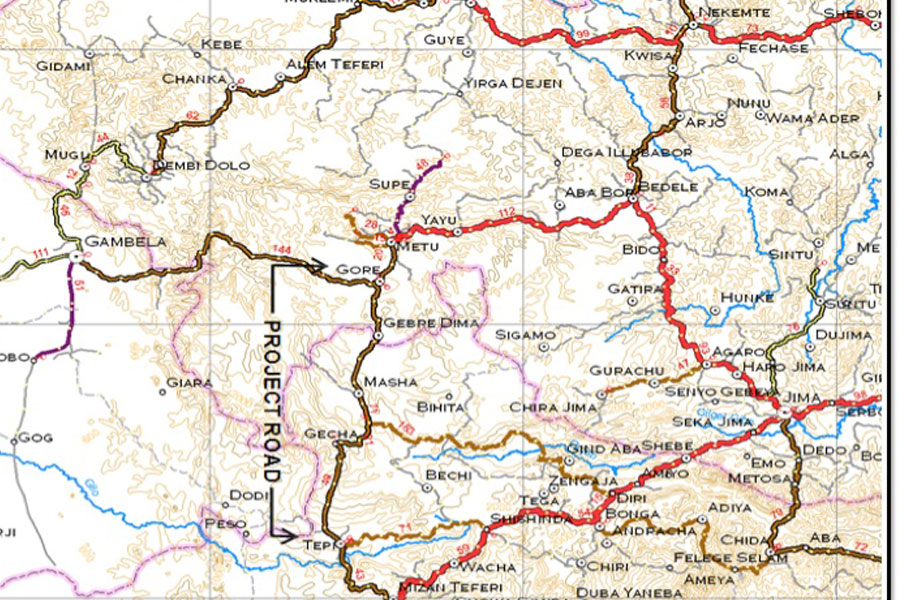
Radar | May 24,2025
Aug 19 , 2023
By MUNIR SHEMSU ( FORTUNE STAFF WRITER )
To curb the rising trend of counterfeit education certifications the Federal Education & Training Authority launched certifications through a combination of QR codes, badges and a mobile application two weeks ago.
The Authority inked a deal with a 94-year-old Swiss-based company to acquire 24,000 security codes in six months across its six branches.
Société Industrielle et Commerciale de Produits Alimentaires (SICPA) provides security inks for currencies and sensitive documents including ID, passports, transport and lottery tickets.
It will utilise a program dubbed CERTUS that creates a digital seal embedded in a QR code on the document timestamped through blockchain technology. This in turn, allows anyone to verify the document's authenticity without having to check with the issuer.
A series of campaigns to battle fraudulent education documents within the civil service and private sector by successive ministries of education were deemed loss-making.
The current Minister, Berhanu Nega (Prof) disclosed to Parliamentarians while presenting the nine-month performance report that five per cent of 18,928 education credentials submitted by higher education institutions were found fraudulent. He revealed that 225 employer authentication requests had revealed that 40pc were counterfeit.
Executive Director of the ICT department at the Authority Addis Gizaw expects the new system to limit the number of falsified education documents in the labour force once it gets launched at full scale.
He explained that problems in the authentication of education credentials have been a long-standing problem which can only be tackled with an automated solution. He reasoned that the cloud-based nature of the service renders it cost-effective and easy to implement.
"We have been looking for winning ideas for a while," Addis told Fortune.
The director had been searching for a suitable supplier for the digital system since October after finishing a proposal submitted to his higher-ups on automated tools to solve the problem of fraudulent certificates.
According to the Director, a digital badge containing a QR code and tracking number will be imprinted onto the documents, allowing any employer to scan through a camera or check the tracking number online.
Addis disclosed that a domestic program developed in cooperation with Jimma University will be availed in the coming weeks that will cross-check documents between employers across the country.
The program launched in cooperation with SICPA is currently free of charge with nationwide implementation slated after assessing its ease of absorption into the existing framework over the next six months.
The Authority currently oversees accreditation for programs across 324 private colleges and 55 state-owned universities. It is also tasked to issue equivalency letters to foreign employers with 300 given out this year.
Amidst growing numbers of unemployment rates in the country which stand around 20pc in the capital, an industry of Human Resource consultants and headhunters has been slowly getting a footing.
Misganaw Alemu, founder and general manager of New Talent and HR Solutions, has linked job hunters in several industries to employers nationwide. His company is currently facilitating the hiring 1,200 sales representatives for DSTV Ethiopia.
He says the daunting nature of authenticating education credentials has forced them to do secondary screenings and in-house tests.
"A digital solution would make our jobs much easier," said Misganaw.
He observed a gap in the labour market which could reap benefits for both companies and promising talent after two decades of service as human resources manager in several companies.
While Misganaw does not believe that a degree translates to employability, he feels that the new system by the Authority will give weight to education certificates as a whole.
The widespread presence of fraudulent education credentials has been a longstanding problem across Africa with a study by J&E Consulting in Zimbabwe suggesting that credentialism and a high unemployment rate combine to fuel the proliferation of fake credentials.
Increasing adoption and access to modern printing options by a large majority of the public has also made it easier for culprits to engage in the practice.
"Better late than never," said Alemayehu Tekelemariam (PhD), a researcher and lecturer on education for three decades. He equivocates fake education credentials to theft, especially by those who become teachers themselves.
For Alemayehu, most education certificates in the country are either proof of cheating prowess or completely fake claims.
The lecturer recalled a distasteful experience in which he informed administrators at a certain college of counterfeit credentials to little effect, with them opting to overlook his concerns.
"This is one of the reasons for poor service at institutions," he said.
Having observed increased effort from his students after strict stipulations for obtaining a degree were put forth by the Ministry of Education, the lecturer welcomes the tight regulatory oversight with open arms.
Education is a serious matter as it determines the larger population's knowledge, skill and ethical demeanour in the long run, he said.
PUBLISHED ON
Aug 19,2023 [ VOL
24 , NO
1216]

Radar | May 24,2025

Fortune News | Dec 19,2018

Radar | Nov 12,2022

Radar | Apr 24,2023

Fortune News | Sep 10,2021

Fortune News | Nov 27,2018

Radar | May 12,2024

Fortune News | Jul 10,2020

My Opinion | Dec 04,2021

Life Matters | May 20,2023

Dec 22 , 2024 . By TIZITA SHEWAFERAW
Charged with transforming colossal state-owned enterprises into modern and competitiv...

Aug 18 , 2024 . By AKSAH ITALO
Although predictable Yonas Zerihun's job in the ride-hailing service is not immune to...

Jul 28 , 2024 . By TIZITA SHEWAFERAW
Unhabitual, perhaps too many, Samuel Gebreyohannes, 38, used to occasionally enjoy a couple of beers at breakfast. However, he recently swit...

Jul 13 , 2024 . By AKSAH ITALO
Investors who rely on tractors, trucks, and field vehicles for commuting, transporting commodities, and f...

Jul 5 , 2025
Six years ago, Ethiopia was the darling of international liberal commentators. A year...

Jun 28 , 2025
Meseret Damtie, the assertive auditor general, has never been shy about naming names...

Jun 21 , 2025
A well-worn adage says, “Budget is not destiny, but it is direction.” Examining t...

Jun 14 , 2025
Yet again, the Horn of Africa is bracing for trouble. A region already frayed by wars...